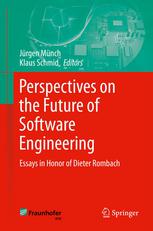

Most ebook files are in PDF format, so you can easily read them using various software such as Foxit Reader or directly on the Google Chrome browser.
Some ebook files are released by publishers in other formats such as .awz, .mobi, .epub, .fb2, etc. You may need to install specific software to read these formats on mobile/PC, such as Calibre.
Please read the tutorial at this link: https://ebookbell.com/faq
We offer FREE conversion to the popular formats you request; however, this may take some time. Therefore, right after payment, please email us, and we will try to provide the service as quickly as possible.
For some exceptional file formats or broken links (if any), please refrain from opening any disputes. Instead, email us first, and we will try to assist within a maximum of 6 hours.
EbookBell Team

4.7
46 reviewsThe dependence on quality software in all areas of life is what makes software engineering a key discipline for today’s society. Thus, over the last few decades it has been increasingly recognized that it is particularly important to demonstrate the value of software engineering methods in real-world environments, a task which is the focus of empirical software engineering. One of the leading protagonists of this discipline worldwide is Prof. Dr. Dr. h.c. Dieter Rombach, who dedicated his entire career to empirical software engineering. For his many important contributions to the field he has received numerous awards and recognitions, including the U.S. National Science Foundation’s Presidential Young Investigator Award and the Cross of the Order of Merit of the Federal Republic of Germany. He is a Fellow of both the ACM and the IEEE Computer Society. This book, published in honor of his 60th birthday, is dedicated to Dieter Rombach and his contributions to software engineering in general, as well as to empirical software engineering in particular.
This book presents invited contributions from a number of the most internationally renowned software engineering researchers like Victor Basili, Barry Boehm, Manfred Broy, Carlo Ghezzi, Michael Jackson, Leon Osterweil, and, of course, by Dieter Rombach himself. Several key experts from the Fraunhofer IESE, the institute founded and led by Dieter Rombach, also contributed to the book. The contributions summarize some of the most important trends in software engineering today and outline a vision for the future of the field. The book is structured into three main parts. The first part focuses on the classical foundations of software engineering, such as notations, architecture, and processes, while the second addresses empirical software engineering in particular as the core field of Dieter Rombach’s contributions. Finally, the third part discusses a broad vision for the future of software engineering.